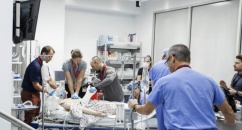Pocus Competency Program
Dalhousie Department of Emergency Medicine has a program in place for the assessment of Core PoCUS Competency. This process is based on recommendations from the International Federation for Emergency Medicine – PoCUS Guidance.
Dalhousie University Department of Emergency Medicine Point of Care Ultrasound Committee
The chair of the Dalhousie Department of Emergency Medicine Point of Care Ultrasound Committee is a rotating one with a term set of 2 years. The chair will convene an annual in-person meeting and will facilitate communication within the group during the intervening months.
Responsible to develop and deliver point of care ultrasound (PoCUS) training for medical students during their emergency medicine clerkship and to work with the Dalhousie University undergraduate ultrasound curriculum development group to promote PoCUS training during all stages of undergraduate training. To liaise with the Education Committee and other programs when required.
Responsible to develop and deliver point of care ultrasound (PoCUS) training and assessment for residents and fellows during their emergency medicine program; to work with the CAEP and CEUS ultrasound curriculum development groups to promote PoCUS training during all stages of postgraduate training. To liaise with the Education Committee and other programs when required.
Responsible to develop and deliver point of care ultrasound (PoCUS) training, assessment and continuing education for emergency physicians; to work with the CAEP and CEUS ultrasound curriculum development groups to promote PoCUS standards. To liaise with the CPD Committee and other programs when required.
Responsible to develop and deliver point of care ultrasound (PoCUS) training, assessment and continuing education for residents and fellows during their paediatric emergency medicine program and for all emergency physicians involved in the care of children; to work with the CAEP and CEUS ultrasound curriculum development groups to promote PoCUS training during all stages of paediatric emergency medicine training. To liaise with the PEM Fellowship Committee and other programs when required.
Responsible to develop and promote PoCUS research in the department of emergency medicine; to work with the CAEP and CEUS research networks to encourage collaboration in PoCUS research. To liaise with the Research Committee and other programs when required.
Core Competency Assessment
Before proceeding to Core Competency Assessment, the physician should have completed a suitable theory course or series of modules, and received hands-on instruction. At Dal we offer the ECCU course. They should then have carried out supervised practice of the specified number of scans with maintenance of a log.
Core Competency covers assessments of:
- Focused Diagnostic Ultrasound Assessment for
- Abdominal Aortic Aneurysm, (AAA)
- Abdominal, Pelvic and Pericardial free fluid in Trauma (FAST)
- Pericardium and Ventricular motion (Echo in Life Support)
- Early Pregnancy – confirmation of intra-uterine pregnancy (IUP)
- Pleural/Thoracic free fluid (eFAST)
- Lung Sliding (rule out Pneumothorax, eFAST)
- Focused Procedural Ultrasound Guidance for
- Insertion of venous catheter
When the physician has reached the recommended number of scans for an assessment (your trainer will give guidance on the recommended number of scans you require for each modality), the relevant section of the document is completed by an assessor who will assess them as they scan a patient / volunteer (image acquisition), interpret images and apply their findings to standardized clinical scenarios. When each section is successfully completed, the whole document forms proof of achieving core competency. Whilst the minimum standard is competency to perform, Emergency Physicians should be aspiring for competence to teach. Ultrasound simulation may be used to demonstrate pathology or needle guidance.
PoCUS Competency [300kb]
- CAEP PoCUS Assessments [227kb]
- Aorta [229kb]
- Fast [230kb]
- Cardiac [228kb]
- Early Pregnancy TA [210kb]
- Early Pregnancy TV [246kb]
- Shock IVC [229kb]
- eFast Thoracic [230kb]
- Vascular Access [245kb]
- All [425kb]


